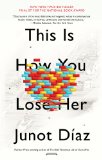Summary | Excerpt | Reading Guide | Reviews | Beyond the book | Read-Alikes | Genres & Themes | Author Bio

Stories
by Lysley TenorioWhen I review a book from a new-to-me author, I deliberately try to shield myself from any outside opinion or assumptions about his or her writing - I hate when my expectations ruin what could otherwise be a great read. Stepping into Monstress by Lysley Tenorio, I only knew that it was a collection from a Filipino author. I was thrilled to find a wide range of viewpoints and experiences and a steady stream of incredibly vivid characters who share a need for love, acceptance, and understanding.
The settings for these stories range from a Philippine leper colony in the 1950s to an army camp in California to Hollywood. We meet the Beatles, B-movie makers, teenage superheroes, and transsexuals. Each protagonist is painfully vulnerable and utterly recognizable in the mirror. Some of Tenorio's stories are fictional accounts of real events - such as the time the Beatles went to the Philippines and were attacked by Marcos supports ("Help"), and the made-up history of a real film that spliced together an old Filipino movie and a current Hollywood flick ("Monstress").
The stories in Monstress are like perfect bites out of someone's life. Each is full-bodied and rich with detail and emotion, savoring the inner lives of its characters. They are an experience in depth, but not breadth. Focused and wonderful and intense, and then they're gone.
There are no duds here, and each story is unique. A favorite was "Felix Starro," the story of a young man and his grandfather who come to the US on a short trip to offer faith healing to the Filipino community in San Francisco. While those who live in the Philippines are losing that faith, others who have moved to a new country crave the beliefs of their homeland. The grandson, Felix III, lends no credence to what his grandfather is doing and hopes that his faith in America will save him from the ills of his own life. What he discovers, of course, is that he's looking for hope, just like the patients he ridicules. We are none of us so very different from everyone else.
Most of the stories also feature family units - some more complete and functioning than others - and Tenorio explores the ties that bind (and sometimes break) our birth families. I think I read a lot of cross-cultural fiction, heavy in the simultaneous confusion and clarity of the immigrant experience, because - in the right hands - it's a powerful genre for the exposition of the human experience. Just as learning a second language teaches you so much about your own, having to learn a new culture teaches us about our own lives.
The style in all of these stories is very straightforward - no postmodern trickery or stories in verse - just standard narratives with exemplary execution. While the book has no overt, all-encompassing theme or recurring characters, all of the stories are like courses from the same meal - some sweet, some warm - that together make for a very satisfying experience.
![]() This review
first ran in the February 16, 2012
issue of BookBrowse Recommends.
This review
first ran in the February 16, 2012
issue of BookBrowse Recommends.

If you liked Monstress, try these:

by Junot Diaz
Published 2013
The stories in This Is How You Lose Her, by turns hilarious and devastating, raucous and tender, lay bare the infinite longing and inevitable weaknesses of our all-too-human hearts.

Happiness Is a Chemical in the Brain
by Lucia Perillo
Published 2013
Set in a small town in the Pacific Northwest, Lucia Perillo's story collection is a sharp-edged, witty testament to the ambivalence of emotions, the way they pull in directions that often cancel one another out or twist their subjects into knots.
Your guide toexceptional books
BookBrowse seeks out and recommends the best in contemporary fiction and nonfiction—books that not only engage and entertain but also deepen our understanding of ourselves and the world around us.